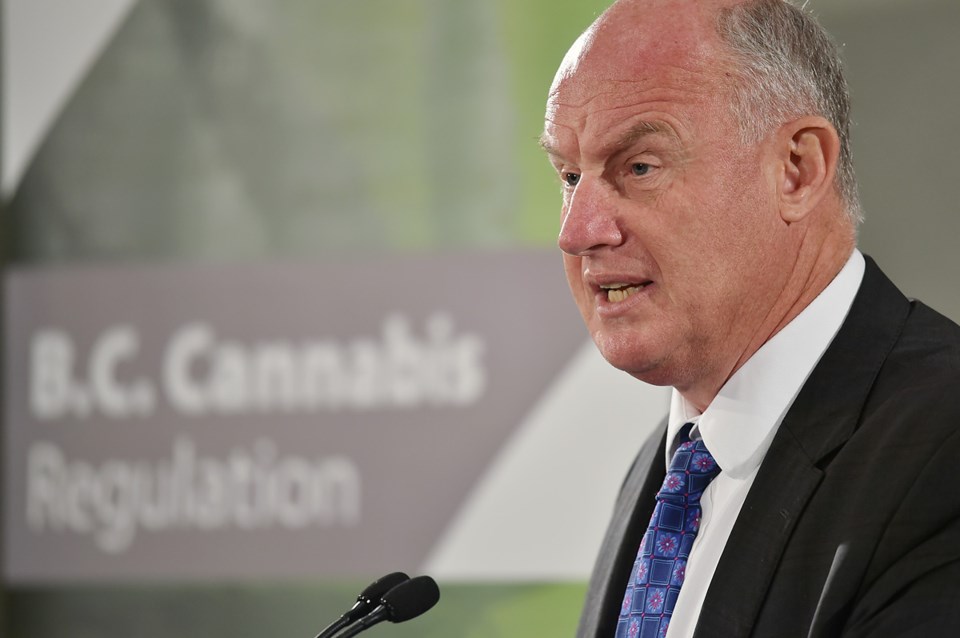B.C. got its first substantive update of 2018 around how the province will respond to impending federal cannabis legalization this summer.
Minister of Public Safety and Solicitor General Mike Farnworth fielded questions concerning personal possession, provincial versus municipal responses, consumption in rental properties and in public, and the licensing process.
Because the federal regulatory framework is still being finalized in Ottawa, outstanding questions remain around price points, anticipated revenues and the amount of pot shops that could be in operation before the end of the year.
But for now, here’s what we know:
Location, location, location
- B.C.’s Liquor Distribution Branch will operate a new standalone network of public retail stores and the Liquor Control and Licensing Branch will be responsible for licensing private stores and monitoring the retail sector. Online sales will also be permitted for public retail stores.
- While the province signs off on licensing, municipalities will have a significant say on most everything else: location, zoning and individual community requirements.
- Landlords and strata councils will be able to restrict or prohibit non-medical cannabis smoking and vaping at tenanted and strata properties. That said, whether leases can be broken or altered specifically with respect to the incoming legislation hasn’t been determined. “That’s one of the issues that we are actively working on,” Farnworth said.
- Licensed retailers will not be able to sell cannabis in the same stores as liquor or tobacco. In fact, those operations will be restricted to cannabis-related products only — no gas, clothes or Lotto tickets, for example.
- Both private and public locations can sell ancillary products such as rolling papers, holders, pipes and bongs.
- Non-medical cannabis retail stores will not be co-located with any other businesses such as liquor stores or pharmacies.
Time is money
- Farnworth said the first public cannabis retailer will be open by the end of this summer. The first private retailer is expected around the same time, depending on local government requirements.“I expect there’s going to be considerable public interest,” Farnworth said. “But at the same time, I think it’s also one of those things where people are going to have to know what they’re doing if they want to be successful.”
- The BC Liquor Distribution Branch aims to open the first government-operated, non-medical cannabis retail store by late summer, and has begun exploring an e-commerce model to offer online sales to the public.
- The province will launch an early registration process this spring for all residents and businesses seeking a cannabis retail license.
The product
- Edible cannabis will not be available in any retail operation until next year at the earliest.
- Sampling — similar to wine tasting in a liquor store — will not be allowed.
- Craft cannabis or boutique operations — similar to craft breweries or wineries — where cannabis is grown, produced and sold all on site will not be permitted. “There are no plans to allow direct producer sales,” Farnworth said. “Everything will be sold through the provincial branch. That’s the only way product will be able to get out into the retail market.”
Personal dos and don’ts
- Unlike Colorado, which legalized marijuana in 2014, cannabis consumption will be allowed in some public places. The no-go spots include high traffic, public areas like community beaches, parks and playgrounds. Farnworth said municipal governments will have the authority to tack on additional regulations at their discretion.
- Farnworth said the reason for opting against a whole-sale public ban is rooted in the massive enforcement effort it would require.
- Four plants can be grown per household. The dried cannabis from those plants are for personal consumption and cannot be sold.
- Those over the age of 19 will be allowed to possess up to 30 grams. Residents under 19 will be prohibited from possessing any non-medical cannabis.
- Cannabis transported in a motor vehicle will need to be in a sealed package, or inaccessible to vehicle occupants.
- Home cultivation will be banned from dwellings where there are kids — daycares, for example.
- Both government and private stores will sell a maximum of 30 grams of dried cannabis (or its equivalent in oil) to an individual at one time.
Cannabis laws and restrictions:
- Private retail stores will not be permitted to offer online sales.
- Unlike liquor stores, minors will not be permitted to enter non-medical cannabis retail stores, even if they are accompanied by a parent or guardian.
- Impaired driving rules in place now will continue to be applied in cases of non-medical cannabis use.
- A new 90-day administrative driving prohibition for drug-affected driving will be introduced.
- The current zero-tolerance restrictions for the presence of alcohol for drivers in the Graduated Licensing Program will be expanded to include zero tolerance for the presence of THC, the active ingredient in cannabis.



